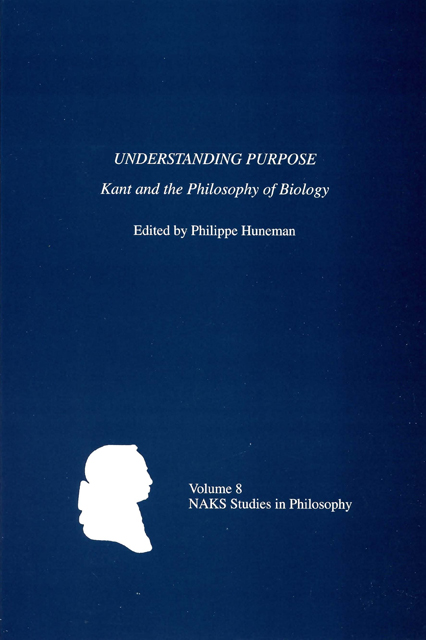Book contents
- Frontmatter
- Contents
- Acknowledgments
- Editor's Notes
- Introduction: Kant and Biology? A Quick Survey
- 1 Pre-Kantian Revival of Epigenesis: Caspar Friedrich Wolff's De formatione intestinorum (1768–69)
- 2 Kant's Persistent Ambivalence toward Epigenesis, 1764–90
- 3 Reflexive Judgment and Wolffian Embryology: Kant's Shift between the First and the Third Critiques
- 4 Kant's Explanatory Natural History: Generation and Classification of Organisms in Kant's Natural Philosophy
- 5 Succession of Functions and Classifications in Post-Kantian Naturphilosophie around 1800
- 6 Goethe's Use of Kant in the Erotics of Nature
- 7 Kant and British Bioscience
- Bibliography
- Contributors
- Index
Introduction: Kant and Biology? A Quick Survey
Published online by Cambridge University Press: 10 March 2023
- Frontmatter
- Contents
- Acknowledgments
- Editor's Notes
- Introduction: Kant and Biology? A Quick Survey
- 1 Pre-Kantian Revival of Epigenesis: Caspar Friedrich Wolff's De formatione intestinorum (1768–69)
- 2 Kant's Persistent Ambivalence toward Epigenesis, 1764–90
- 3 Reflexive Judgment and Wolffian Embryology: Kant's Shift between the First and the Third Critiques
- 4 Kant's Explanatory Natural History: Generation and Classification of Organisms in Kant's Natural Philosophy
- 5 Succession of Functions and Classifications in Post-Kantian Naturphilosophie around 1800
- 6 Goethe's Use of Kant in the Erotics of Nature
- 7 Kant and British Bioscience
- Bibliography
- Contributors
- Index
Summary
Kant's Critique of Judgment is known as a major metaphysical achievement concerning the concept of purpose. Under the term Naturzweck, Kant tries to legitimize the use of purposive categories in the life sciences without any theological commitment, notwithstanding the whole philosophical tradition from stoicism to natural theology. Between the Spinozist or Humean critique of fi nality as an illusory concept—conceived either from a Cartesianrationalist or an empiricist point of view—and the Leibnizian-Wolffi an assumption of fi nality as the link between natural history and theology, Kant recognized an epistemological value of the concept of fi nality while denying its major ontological implications concerning some creative intention at the source of the universe and of living beings. The natural purposes, Naturzwecke, are organisms, or organized beings, Organisierte Wesen. This main thesis of the Critique of Judgment meant that living creatures could— indeed, must—be conceived as purposive entities, that is, as possible solely according to a concept, but that this concept need not to be instantiated in reality; it merely has to be presupposed for us as a principle of knowledge. Kant called this supposition a “regulative use” of the concept of fi nality. Hence, the epistemological requirement of a specifi city for the knowledge of living beings is satisfi ed, while at the same time, no commitment is made to something outside the reach of natural science and its methods. Therefore we can ask: To what extent did Kant really naturalize purpose?
This question is as much an issue for the history of philosophy as for the history of science. Kant's metaphysical elucidation of purpose stemmed, of course, from his previous considerations about the possibility of knowledge, realism concerning an order of nature, limits of reason, and so on. As such, however, it concerns some major advances in the life sciences, such as in descriptive embryology or comparative anatomy. This is attested to by Kant's various quotations, references, and discussions of scientists in those domains; Blumenbach and the major anthropologists Plattner and Hufeland; anatomists such as Soemmering; naturalists such as Buffon, Maupertuis, and Erxleben;and the four great men of eighteenth-century physiology: Boerhaave, Stahl, Hoffmann, and Haller.
- Type
- Chapter
- Information
- Understanding PurposeKant and the Philosophy of Biology, pp. 1 - 36Publisher: Boydell & BrewerPrint publication year: 2007



